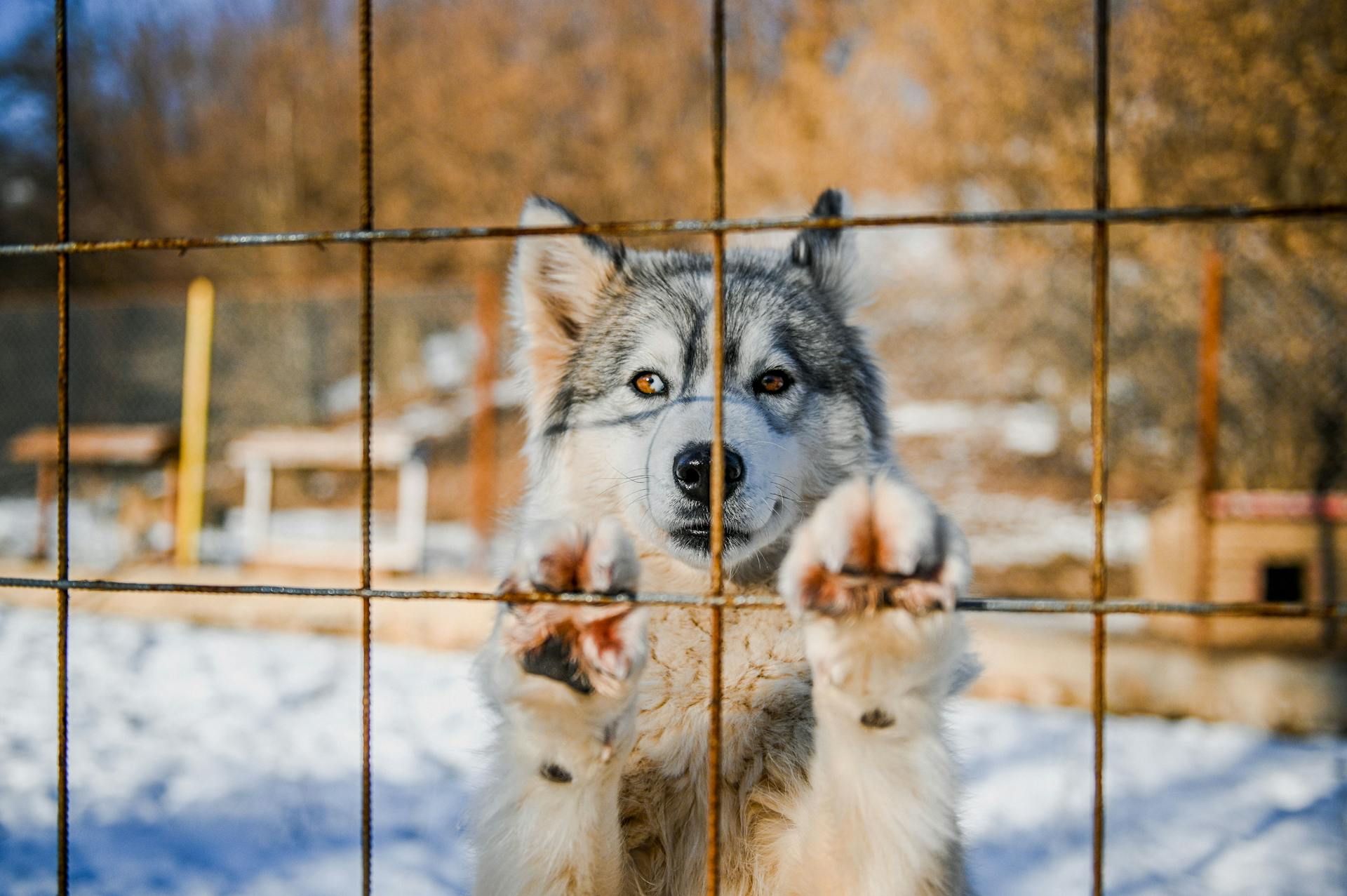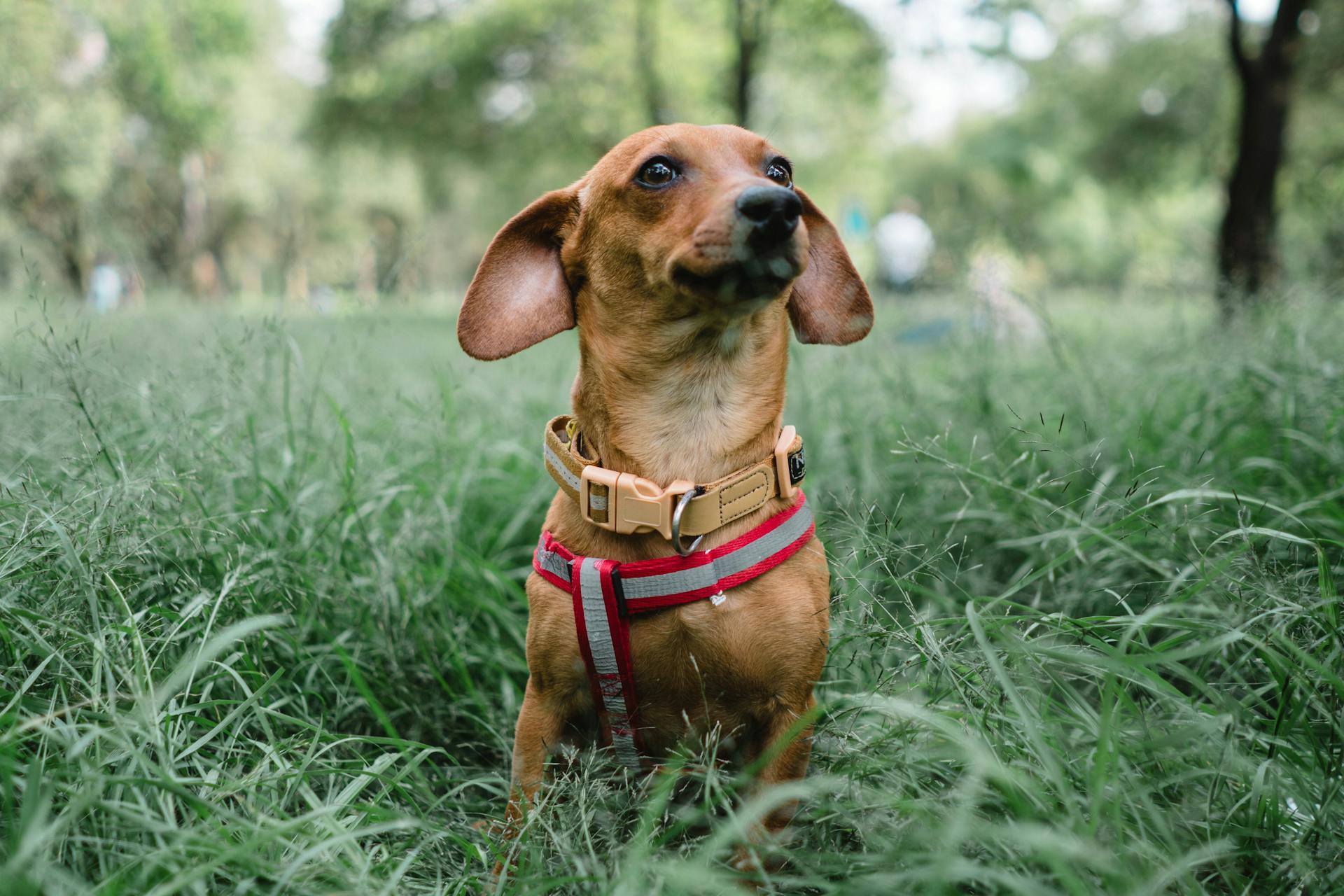
Neutering a dog can indeed help with aggression, but it's not a straightforward solution. Some research suggests that neutering can reduce aggression in certain breeds of dogs, such as Pit Bulls and Rottweilers.
Studies have shown that neutering can reduce the levels of testosterone in a dog's body, which can contribute to aggression. In fact, one study found that neutering reduced aggression in 70% of cases.
However, it's essential to note that neutering is not a guarantee against aggression. Many factors contribute to a dog's behavior, and neutering is just one potential solution.
Related reading: Prey Drive in Dogs How to Stop It
Neutering and Aggression
Neutering a dog may actually make aggression worse, not better. In fact, studies have shown that neutered male dogs are more likely to show aggression when strangers approach the home, when they're approached by an unknown female dog, or when small animals enter the yard.
The behaviors of neutered male dogs tend to be less desirable, with 40 out of 100 behaviors assessed showing statistically significant differences between castrated and intact dogs. Only four of these behaviors showed a more positive outcome as a result of neutering.
Early neutering, in particular, can lead to even greater negative effects on behavior. This means that if you're considering neutering your dog, it's essential to think carefully about the timing and potential consequences.
Some of the negative behaviors associated with neutering include increased aggression, fearful behavior, and over-excitability. In contrast, intact dogs are less likely to exhibit these behaviors, suggesting that neutering may not be the solution to aggression problems.
Here are some specific behaviors that are more common in neutered dogs:
- Aggression towards strangers
- Fear-based behaviors, such as reactions to loud noises and new situations
- Mounting objects, furniture, or people
- Chasing animals
On the other hand, intact dogs are less likely to engage in these behaviors, but they may exhibit other behaviors that are considered undesirable by some owners, such as:
- Howling when left alone
- Marking indoors
- Being less likely to return immediately when called while off-leash
- Being less likely to fetch
Benefits and Considerations
Neutering a dog may not have the behavioral benefits you expect. Intact dogs are more likely to howl when left alone than neutered dogs.
Some owners may notice a decrease in certain behaviors after neutering, but the research suggests these benefits are limited. For example, intact dogs are more likely to mark indoors.
Here are some specific behaviors that may or may not be affected by neutering:
- Howling when left alone: more common in intact dogs
- Marking indoors: more common in intact dogs
- Returning immediately when called while off-leash: less common in intact dogs
- Fetching: less common in intact dogs
Benefits of Neutering
Neutering can have some really interesting benefits for your dog. Intact dogs are more likely to howl when left alone, which can be a sign of separation anxiety.
Neutering can also help with marking indoors - intact dogs are more likely to do this, which can be a real pain to clean up. On the other hand, neutered dogs are less likely to mark indoors, making your life easier.
If you're an off-leash enthusiast, you'll be glad to know that neutered dogs are more likely to return immediately when called. Intact dogs, on the other hand, are less likely to do so.
And That's Not All
Research has shown that neutered dogs may exhibit more anxious behaviors compared to intact dogs.
A study found that owners of intact dogs reported higher scores for "boldness" and "sociability to dogs".
Neutered dogs were found to be easier to train, according to surveyed owners.
The researchers suggest that the knowledge gained from this study is crucial for dog owners and veterinarians to consider, especially since neutering has become a common practice in many countries.

The study's findings raise questions about the effectiveness of neutering as a means to correct undesired habits in dogs.
It's essential to understand the long-term effects of neutering on dog behavior before making a decision.
Waiting until a dog has fully matured before choosing to spay or neuter may have both health and behavioral benefits.
More research is needed to provide a better understanding of the behavioral changes induced by gonadectomy.
Discover more: Dog Behavioral Training near Me
Understanding Canine Behavior
Dogs exhibit a range of natural and normal behaviors that we tend to dislike, including aggression, barking, excessive excitability, humping, pulling on leash, roaming, and urine-marking.
These behaviors are often blamed on the hormones that circulate in reproductively intact dogs, particularly male dogs. This is not entirely unfounded, as humans have long used castration to make horses and cattle more docile.
Some of these behaviors, like aggression and barking, can be influenced by a dog's reproductive status, but it's not the only factor at play. For example, a dog's environment, socialization, and training can also impact their behavior.
Canine Behavior Myths Busted
Neutering, once believed to be a panacea for problematic dog behaviors, has been found to have limited benefits. In fact, research suggests that neutering can actually make some behaviors worse.
A study found that neutered male dogs were more likely to show aggression towards strangers, such as delivery workers, and when approached by unknown female dogs. They were also more likely to react fearfully to loud noises and new situations.
Neutering has been shown to increase fear-based behaviors in dogs, with a 31% increase in fearfulness for both genders. This contradicts the idea that neutering makes pets better, more affectionate companions.
Some common myths about the effects of canine spay/neuter practices include the idea that unsterilized animals exhibit more behavior and temperament problems than those who have been spayed or neutered. However, research suggests that this is not the case.
Here are some common dog behaviors that humans tend to dislike, and how neutering may affect them:
- Aggression (toward other dogs or humans)
- Barking
- Excessive excitability
- Humping
- Pulling on leash
- Roaming
- Urine-marking
Neutering has been found to decrease roaming behavior in intact males pursuing females in season, but it can also lead to an increase in other undesirable behaviors, such as mounting objects, furniture, or people, and chasing animals.
When to Take My Dog Out
Dogs typically reach puberty between 6 months to 2 years of age. This is a critical time for socialization and training.
During this period, hormone surges can influence a dog's behavior, making them more energetic and prone to unwanted behaviors. Puberty is a natural part of a dog's development, just like it is for humans.
If you're considering waiting until your dog reaches social or structural maturity before taking them out, be sure to talk to your veterinarian about what to expect in terms of exercise and training needs.
Potential Drawbacks
Neutering a dog can actually make aggression worse, not better. In a study of 100 behaviors, 40 showed statistically significant differences between castrated and intact dogs, with only four showing a more positive outcome as a result of neutering.
Some of the negative behaviors found in neutered male dogs include aggression towards strangers, unknown female dogs, and small animals entering the yard. These behaviors were worse in dogs that were neutered earlier.
Neutered dogs also demonstrated more fear-based behaviors, such as reactions to loud noises and new situations. This is a concerning trend, especially if you're considering neutering your dog.
Intact dogs, on the other hand, were less likely to engage in undesirable behaviors like eating feces, rolling in feces or other smelly things, barking persistently when alarmed, mounting objects or people, and chasing animals.
Here are some specific behaviors that were affected by neutering:
- Aggression towards strangers
- Aggression towards unknown female dogs
- Aggression towards small animals entering the yard
- Increased fear-based behaviors (e.g. reactions to loud noises and new situations)
- Eating feces
- Rolling in feces or other smelly things
- Barking persistently when alarmed
- Mounting objects or people
- Chasing animals
It's worth noting that early neutering produced an even greater negative effect on behaviors, making it a crucial consideration if you're thinking of neutering your dog.
When to Consider Neutering
Neutering can be a crucial step in reducing aggression in dogs. Studies have shown that early neutering can lead to a significant decrease in aggression levels in male dogs.
If your dog is intact and displaying aggressive behavior, it's essential to consider neutering as a solution. Intact male dogs are more likely to exhibit aggression due to hormonal fluctuations.
Neutering can also help reduce undesirable behaviors such as mounting and roaming in search of a mate. These behaviors can lead to unwanted litters and increased risk of injury or disease.
The ideal time for neutering varies depending on the breed and size of your dog. Generally, it's recommended to neuter small and medium-sized breeds between 4 to 6 months of age, while larger breeds may benefit from waiting until they're a bit older.
If you're unsure about the best time to neuter your dog, consult with a veterinarian for personalized advice. They can help you determine the optimal time based on your dog's individual needs and health status.
Recommended read: What Happens If You Don't Neuter Your Dog?
Frequently Asked Questions
What calms aggression in dogs?
Calm behavior in dog owners can help calm their aggressive dogs, as a peaceful demeanor can be contagious and reduce tension. Staying composed and avoiding sudden movements can help de-escalate aggressive situations.
How does a male dog's behavior change after neutering?
After neutering, male dogs often exhibit reduced mounting behavior, decreased urine marking, and less roaming. These changes can have a significant impact on their overall behavior and lifestyle
How long after neutering does dog behavior change?
Behavior changes after neutering can take up to six weeks to become noticeable, as hormone levels adjust to the surgery. During this time, males may exhibit full-testosterone behaviors despite diminishing hormone levels.
How to stop male on male dog aggression?
Spaying or neutering intact male dogs may help reduce aggression towards other males. Hormone-driven aggression is a common cause of male on male dog aggression, especially if it's accompanied by other signs such as aggression during heat cycles or protecting pups
Sources
- https://vcahospitals.com/know-your-pet/dog-behavior-and-training-neutering-and-behavior
- https://www.drjensdogblog.com/the-quick-fix-neutering-as-a-treatment-for-aggression/
- https://www.dogsnaturallymagazine.com/new-research-does-neutering-help-with-aggression/
- https://www.whole-dog-journal.com/behavior/does-spaying-or-neutering-change-dog-behavior/
- https://www.believeinmagic.dog/post/will-neutering-a-dog-help-with-aggression
Featured Images: pexels.com


